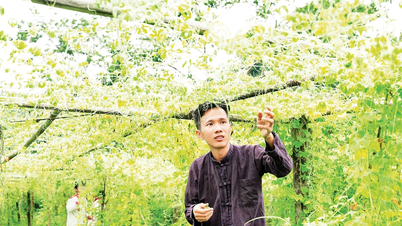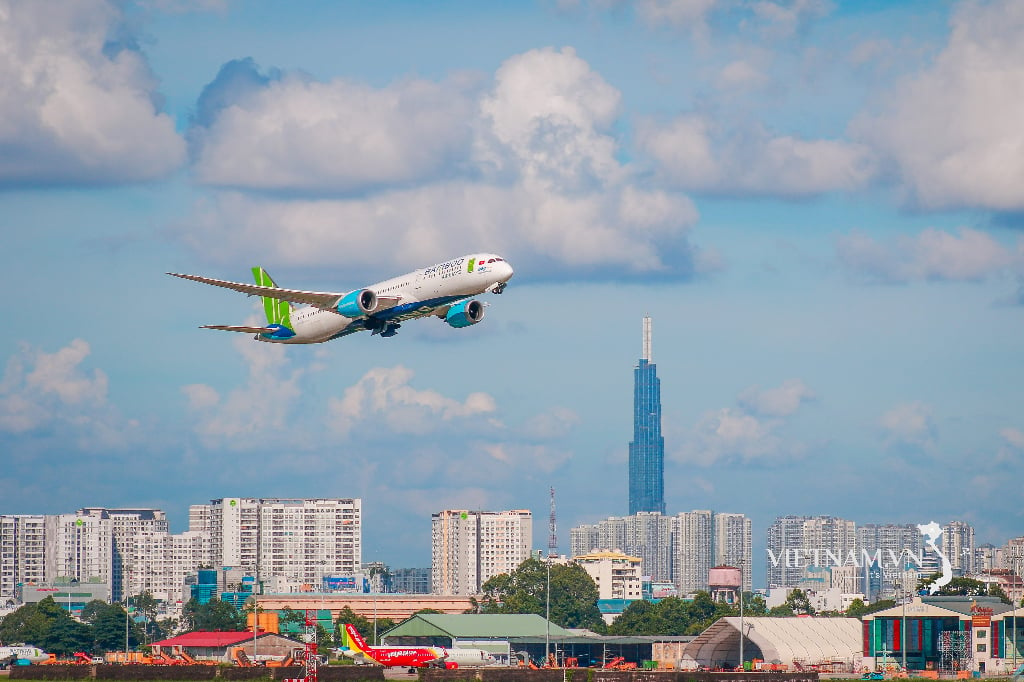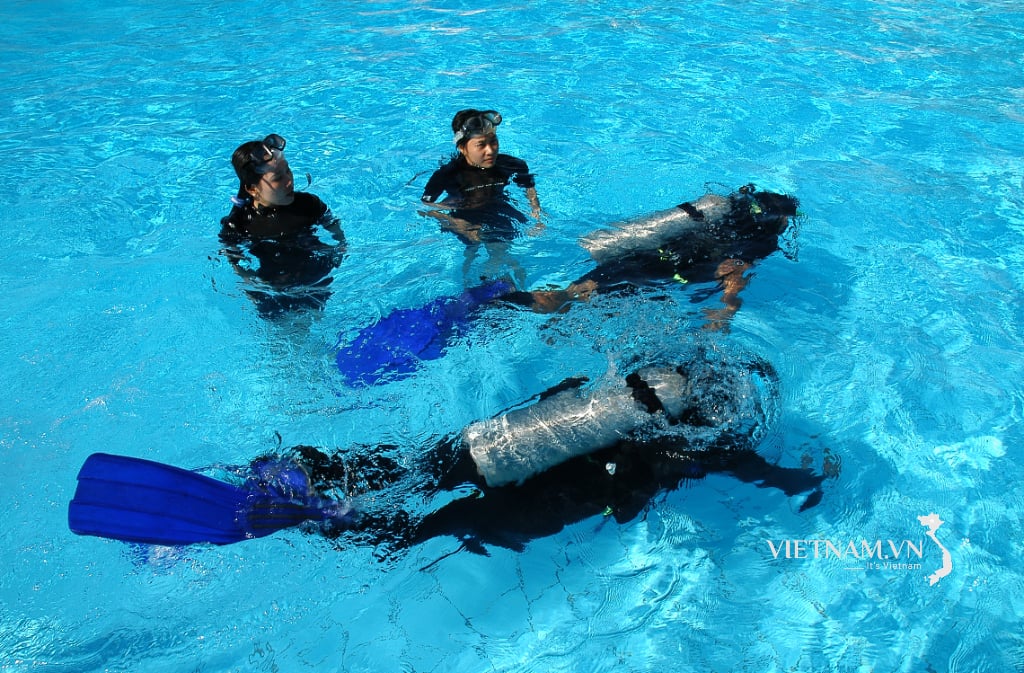Hard - to-break spending habits
The report on the situation of plastic waste generation in Vietnam in 2022, conducted by the World Wildlife Fund (WWF-Vietnam) in collaboration with the Ministry of Agriculture and Environment , shows that every day, Vietnam discharges about 8,021 tons of plastic waste, equivalent to about 2.93 million tons/year. Most of which is single-use plastic such as nylon bags, foam boxes, and straws.
The report also pointed out an alarming fact when microplastic pollution was recorded in all soil, water, air and sediment environments in Vietnam. In the Phuoc Hiep landfill area, Ho Chi Minh City, the microplastic deposition rate was up to 1,367 particles/m²/day, 50 times higher than the monitoring results in the capital Paris, France. In Hanoi's rivers and lakes, the microplastic content was also very high. Microplastic pollution directly affects human health through eating, breathing, increasing the risk of respiratory diseases, cardiovascular diseases and cancer.
 |
| Plastic waste along the coast of An Vinh village , Tinh Khe commune , Quang Ngai province . Photo : Nguyen Ngoc |
The survey “What more than 3,000 students say about the culture of disposable plastic products” conducted by NPAP and VCOM E-commerce Association showed that 67% of participants still choose disposable plastic products because of convenience, while 39% said that alternative solutions are too expensive. However, 40% of students affirmed that they are willing to change their habits if favorable conditions are available.
Reducing Single-Use Plastics: From Policy to Behavior Change
According to experts of the “Project on integrating climate change resilience and environmental protection to develop green cities” of the Department of Environment, Ministry of Agriculture and Environment, If we want to reduce single-use plastics, changing consumer behavior is key. But for behavior to become a long-term habit, we need the support of macro policies .
Experts recommend, Governments and businesses should consider adopting stronger measures, such as taxes or fees on single-use plastic products, to promote the transition to environmentally friendly options.
Decree 08/2022/ND-CP has outlined a specific roadmap, from January 1, 2026, Vietnam will no longer produce or import biodegradable plastic bags smaller than 50cm x 50cm and less than 50 µm thick. After December 31, 2030, our country will completely stop using single-use plastic products, except for products certified with the Vietnam eco-label.
 |
| Single-use plastic waste is rampant on Be Island - Ly Son special economic zone, Quang Ngai province. Photo: Nguyen Ngoc |
In order to address the issue in a large-scale and effective manner, the 2020 Environmental Protection Law also stipulates extended producer responsibility (EPR). Currently, the Ministry of Agriculture and Environment is drafting a decree regulating the responsibility for recycling products, packaging and waste treatment of manufacturers and importers, aiming to consolidate regulations, redesign financial mechanisms, increase transparency and align with international practices. This is an important policy tool to promote the circular economy, forcing businesses to collect, recycle and treat products after use.
Some localities such as Hanoi, Phu Yen, and Con Dao have issued plans to ban single-use plastics in tourist areas, supermarkets, and hotels.
Some retail businesses have also begun to change, switching to using environmentally friendly plastic products. AEON Vietnam has eliminated non-degradable nylon bags, switched to biodegradable bags and materials from bagasse and rice flour; applied plastic bag-free days, green points accumulation programs, and rented returnable bags. Some provinces and cities have implemented a model of waste classification at source, aiming for a "no plastic waste" policy in schools and communities.
Practical solutions at the individual level such as bringing personal water bottles, refusing free plastic bags, and replacing plastic straws with paper or stainless steel are being strongly encouraged. Along with that, community campaigns such as “No Plastic Bag Day”, green clubs in schools, exchanging plastic waste for trees, etc. are being implemented, attracting the participation of the people and a large number of young people.
 |
| Hanoi students participate in Anti-Plastic Day, aiming to promote the reduction of plastic waste in the community. Photo: Nguyen Thao |
Experts say that once awareness has been raised, action needs to be materialized through policies, recycling infrastructure, and active participation of the people. Reducing single-use plastic is not only the task of the government or environmental organizations, but also the daily responsibility of each individual. Each plastic bag refused, each plastic straw not used is a small but meaningful step towards the big goal: For a green - clean - sustainable Vietnam.
Source: https://huengaynay.vn/kinh-te/viet-nam-trong-vong-vay-nhua-thach-thuc-va-giai-phap-xanh-157482.html





![[Photo] Politburo works with the Standing Committees of Vinh Long and Thai Nguyen Provincial Party Committees](https://vphoto.vietnam.vn/thumb/1200x675/vietnam/resource/IMAGE/2025/9/8/4f046c454726499e830b662497ea1893)
![[Photo] General Secretary To Lam chaired the Politburo's working session with the Standing Committees of Party Committees of Central Party agencies.](https://vphoto.vietnam.vn/thumb/1200x675/vietnam/resource/IMAGE/2025/9/9/8343386e1e8f43c6a3c0543da7744901)










![[Photo] General Secretary To Lam chaired the Politburo's working session with the Standing Committees of Party Committees of Central Party agencies.](https://vphoto.vietnam.vn/thumb/402x226/vietnam/resource/IMAGE/2025/9/9/8343386e1e8f43c6a3c0543da7744901)






















![[Photo] Politburo works with the Standing Committees of Phu Tho and Dong Nai Provincial Party Committees](https://vphoto.vietnam.vn/thumb/1200x675/vietnam/resource/IMAGE/2025/9/8/f05d30279b1c495fb2d312cb16b518b0)
![[Photo] Politburo works with the Standing Committees of Dong Thap and Quang Tri Provincial Party Committees](https://vphoto.vietnam.vn/thumb/1200x675/vietnam/resource/IMAGE/2025/9/8/3e1c690a190746faa2d4651ac6ddd01a)



























































Comment (0)